
JOURNAL OF PEDIATRIC GASTROENTEROLOGY AND NUTRITION
Scope & Guideline
Leading the way in pediatric gastroenterology and nutrition advancements.
Introduction
Aims and Scopes
- Pediatric Gastroenterology:
Research on a variety of gastrointestinal disorders affecting children, including inflammatory bowel disease, celiac disease, and functional gastrointestinal disorders. This area encompasses clinical studies, diagnostic advancements, and treatment protocols. - Nutritional Management:
Focus on the nutritional needs and interventions for pediatric populations, including studies on enteral and parenteral nutrition, dietary practices in chronic conditions, and the role of nutrition in disease management. - Hepatology and Liver Disorders:
Exploration of pediatric liver diseases, including chronic liver conditions, liver transplantation, and metabolic liver diseases. This includes studies on diagnosis, management, and long-term outcomes. - Innovative Therapeutics and Interventions:
Investigation of novel therapeutic approaches, including the use of biologics, probiotics, and dietary interventions to improve health outcomes in children with gastrointestinal and liver disorders. - Multidisciplinary Approaches:
Emphasis on collaborative care involving gastroenterologists, nutritionists, psychologists, and other specialists to address the complex needs of pediatric patients. - Health-Related Quality of Life:
Research aimed at understanding and improving the quality of life for children with gastrointestinal disorders, examining psychological, social, and developmental outcomes.
Trending and Emerging
- Impact of the Gut Microbiome:
Increasing research focus on the gut microbiome's role in health and disease, particularly in relation to conditions like inflammatory bowel disease and functional gastrointestinal disorders. This includes studies on microbiota modulation and its therapeutic implications. - Telemedicine and Remote Care:
Emerging interest in the use of telemedicine and digital health technologies for managing pediatric gastrointestinal disorders, especially in the context of the COVID-19 pandemic. - Psychosocial Aspects of Gastrointestinal Disorders:
Growing recognition of the psychological and social dimensions of gastrointestinal diseases in children, leading to research on mental health outcomes, caregiver burden, and the importance of psychosocial interventions. - Personalized Nutrition and Dietary Interventions:
An increased emphasis on personalized nutritional approaches tailored to individual patient needs, particularly in managing chronic conditions such as obesity, inflammatory bowel disease, and food allergies. - Long-COVID Implications in Pediatrics:
Emerging studies examining the long-term gastrointestinal and nutritional implications of COVID-19 in pediatric populations, reflecting a need for ongoing research in this area.
Declining or Waning
- Traditional Gastroenterology Techniques:
There has been a noticeable decline in studies focusing solely on traditional diagnostic techniques, such as invasive endoscopic procedures, as more emphasis is placed on non-invasive methods and advanced imaging techniques. - Single-Disease Focus Studies:
Research that concentrates on single-disease studies, particularly those that do not incorporate multidisciplinary approaches or consider comorbidities, is becoming less common as the field recognizes the complexity of pediatric patients. - Pharmacological Studies Without Nutritional Context:
Research that examines pharmacological interventions in isolation, without considering the nutritional context or dietary influences, has decreased, reflecting a broader understanding of the interplay between medication and nutrition.
Similar Journals
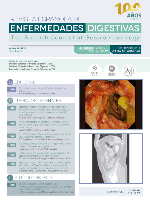
REVISTA ESPANOLA DE ENFERMEDADES DIGESTIVAS
Elevating clinical practices through open access knowledge.REVISTA ESPANOLA DE ENFERMEDADES DIGESTIVAS, a pivotal Open Access journal published by ARAN EDICIONES, S A, has been at the forefront of advancing the field of gastroenterology since its inception in 1990. With a robust commitment to disseminating high-quality research, the journal provides a platform for researchers, clinicians, and students to share innovative findings and insights concerning digestive diseases. The journal is characterized by its Q3 ranking in both Gastroenterology and Miscellaneous Medicine categories, indicative of its significant contributions to these fields, and is positioned within the 36th percentile of Scopus rankings for medicine related to gastroenterology. Based in Spain, REVISTA ESPANOLA DE ENFERMEDADES DIGESTIVAS has embraced the Open Access model since 2004, ensuring that its articles are readily available to a global audience without financial barriers. The journal not only supports academic discourse but also plays a crucial role in improving clinical practices and health outcomes related to digestive health.

Gastroenterology Insights
Innovating Research for a Healthier GutGastroenterology Insights is a premier open-access journal published by MDPI since 2009, focusing on essential research and developments within the fields of gastroenterology and hepatology. With a dedicated ISSN of 2036-7414 and E-ISSN 2036-7422, this journal serves as a vital platform for disseminating innovative studies and insights pertinent to gastrointestinal health, disorders, and treatment modalities. Based in Switzerland, Gastroenterology Insights boasts a significant academic presence, currently positioned in the Q3 quartile for both gastroenterology and hepatology categories as of 2023, reflecting its impactful contributions to the disciplines. With Scopus rankings placing it at the 94th and 48th positions in gastroenterology and hepatology respectively, the journal is committed to advancing knowledge and fostering collaboration among researchers, professionals, and students alike. By providing an open-access model, it ensures that high-quality research is accessible globally, thereby enhancing the reach and impact of crucial findings in the science of digestive health. Researchers looking to publish cutting-edge work will find Gastroenterology Insights a valuable resource for both sharing and acquiring knowledge.

Hepatology Forum
Elevating hepatology insights for practitioners and scholars.Hepatology Forum is an esteemed journal dedicated to disseminating cutting-edge research and insights in the fields of gastroenterology and hepatology. Published by KARE PUBL in Turkey, this journal serves as a vital platform for researchers, clinicians, and healthcare professionals aiming to advance their knowledge and practices related to liver diseases and gastrointestinal disorders. With an ISSN of 1307-5888 and an E-ISSN of 2757-7392, it features peer-reviewed articles that encompass a wide range of topics from basic research to clinical applications. Although categorized in the Q3 quartile for both gastroenterology and hepatology in 2023, Hepatology Forum continues to show significant potential for growth and impact, as evidenced by its Scopus rankings. Through its commitment to open scientific exchange, the journal not only facilitates the sharing of innovative methodologies and findings but also fosters networking among professionals in the field. As it converges through the years from 2020 to 2024, Hepatology Forum remains an important resource for the advancement of liver health and diseases, appealing to both established experts and emerging scholars alike.
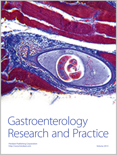
Gastroenterology Research and Practice
Transforming Insights into Improved Patient CareGastroenterology Research and Practice is a leading Open Access journal dedicated to advancing the field of gastroenterology and hepatology. Published by HINDAWI LTD, this journal offers a platform for researchers, clinicians, and healthcare professionals to share their findings and insights on cutting-edge topics in digestive health. With an ISSN of 1687-6121 and an E-ISSN of 1687-630X, it has established its significance within the academic community, evidenced by its ranking in the 2023 Scopus metrics, where it is positioned in the third quartile for both gastroenterology and hepatology disciplines. The journal is recognized for disseminating high-quality, peer-reviewed articles that contribute to the understanding of gastrointestinal disorders, therapeutic advancements, and innovative practices. Since its inception as an Open Access journal in 2008, Gastroenterology Research and Practice has removed barriers to access, ensuring that vital research reaches a global audience. This ongoing commitment to increasing accessibility, alongside its continuous publication from 2009 to 2024, underscores its importance as a resource for the academic and clinical communities striving to improve patient outcomes in digestive diseases.
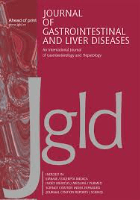
Journal of Gastrointestinal and Liver Diseases
Unveiling the Latest in Gastrointestinal and Liver DiseasesThe Journal of Gastrointestinal and Liver Diseases, published by MEDICAL UNIV PRESS in Romania, serves as a pivotal platform for the dissemination of significant research in the fields of gastroenterology and hepatology. Established in 2006, this journal has evolved over the years, currently holding a Q3 rank in Gastroenterology and a Q2 rank in Medicine (miscellaneous), reflecting its commitment to high-quality scholarship and impactful contributions to medical science.
With an ISSN of 1841-8724 and an E-ISSN of 1842-1121, the journal engages a diverse readership of researchers, clinicians, and students passionate about advancing knowledge in gastrointestinal and liver health. While it currently does not operate under an open access model, the journal remains a vital resource for those seeking to stay updated on the latest developments and emerging trends in the field. As it converges towards a broader impact, projected through its coverage until 2024, the Journal of Gastrointestinal and Liver Diseases continues to contribute to the academic landscape, encouraging innovation and comprehensive understanding in digestive health.
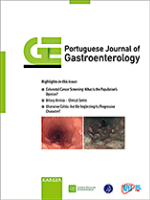
GE Portuguese Journal of Gastroenterology
Unlocking Insights in Gastroenterology ResearchThe GE Portuguese Journal of Gastroenterology, published by KARGER, is a prominent platform in the field of gastroenterology, providing a vital forum for the dissemination of high-quality research since its establishment. With an open access model implemented in 2012, the journal ensures that emerging findings in gastrointestinal health are readily accessible to a global audience, facilitating the exchange of critical knowledge among researchers, practitioners, and students alike. Based in Switzerland, this journal has earned a respected position within the academic community, currently holding a Q3 ranking in the gastroenterology category for 2023, alongside a Scopus rank of #113 out of 167 in its field. Spanning converged years from 2014 to 2024, the GE Portuguese Journal of Gastroenterology aims to bridge gaps in research and practice, fostering collaboration and innovation across diverse areas within the discipline. Authors and readers alike benefit from the journal's commitment to advancing knowledge and practice in gastroenterology.

Korean Journal of Gastroenterology
Uniting Experts for Enhanced Digestive Health SolutionsKorean Journal of Gastroenterology (ISSN: 1598-9992, E-ISSN: 2233-6869), published by the Korean Society of Gastroenterology, has been a premier outlet for research and advancements in the field of gastroenterology since its inception in 1968. This open-access journal, based in South Korea, fosters a global dialogue on gastrointestinal health, embracing contributions from a diverse array of disciplines within medicine. It is currently ranked in the Q4 quartile for miscellaneous medicine and holds a Scopus rank of #323 out of 636 in general medicine, reflecting its commitment to publishing impactful research despite its relatively recent establishment in high-impact metrics. With a continuous publication timeline extending through to 2024, the journal aims to enhance understanding of gastrointestinal disorders and promote innovative treatments, making it an essential resource for researchers, clinicians, and students alike who seek to stay abreast of the latest developments and clinical applications in gastroenterology.
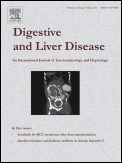
DIGESTIVE AND LIVER DISEASE
Innovating research for better patient outcomes.DIGESTIVE AND LIVER DISEASE is a prominent journal published by Elsevier Science Inc, dedicated to advancing the field of gastroenterology and hepatology. With an ISSN of 1590-8658 and an E-ISSN of 1878-3562, this journal has established itself as a significant resource within the academic community, especially considering its Q2 ranking in both gastroenterology and hepatology categories as of 2023. Spanning from 2000 to 2024, the journal presents a diverse array of peer-reviewed articles, clinical studies, and review papers that explore the latest advancements and research findings in digestive and liver diseases. The journal's robust impact, reflected in its Scopus rankings—40th out of 167 in gastroenterology and 28th out of 82 in hepatology—highlights its critical role in shaping practices and understanding in these vital areas of medicine. With open access options available, DIGESTIVE AND LIVER DISEASE aims to make high-quality research accessible to a wider audience, thereby encouraging collaboration and innovation. Researchers, healthcare professionals, and students alike will find valuable insights into the complex mechanisms, diagnostics, and therapeutic strategies pertinent to digestive and liver health.

Frontline Gastroenterology
Championing Excellence in Gastroenterological ResearchFrontline Gastroenterology is a leading academic journal published by the BMJ Publishing Group that plays a vital role in advancing the field of gastroenterology and hepatology. Established in 2013, this prestigious journal has established itself as a significant resource for researchers, healthcare professionals, and students alike, maintaining a commendable impact factor and consistently achieving a Q2 ranking in both gastroenterology and hepatology categories as of 2023. With its focus on disseminating high-quality, peer-reviewed research, Frontline Gastroenterology covers a wide scope of topics pertinent to the understanding, diagnosis, and treatment of gastrointestinal and liver diseases. Although it does not offer Open Access options, its content is accessible through various institutional and personal subscriptions, ensuring that critical findings reach an international audience. As the journal continues to converge into the future, it remains dedicated to fostering innovation and dialogue in gastroenterological sciences.

GUT
Pioneering Research for Digestive Health ExcellenceGUT is a premier journal in the field of gastroenterology, published by the esteemed BMJ Publishing Group. With a rich history dating back to 1960 and an impressive convergence of research expected to continue through 2024, GUT has established itself as a cornerstone of academic discourse in the gastrointestinal sciences. The journal boasts a remarkable impact factor, positioning it in the Q1 category for gastroenterology with an outstanding rank of #3 out of 167 in its Scopus ranking, reflecting its 98th percentile status among peers. Although it does not currently offer open access options, GUT remains dedicated to disseminating high-quality research, reviews, and clinical studies that advance the understanding of digestive health. Published in the United Kingdom, GUT serves as an essential resource for researchers, clinicians, and students aiming to stay at the forefront of innovations and developments in the field.